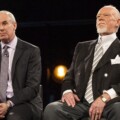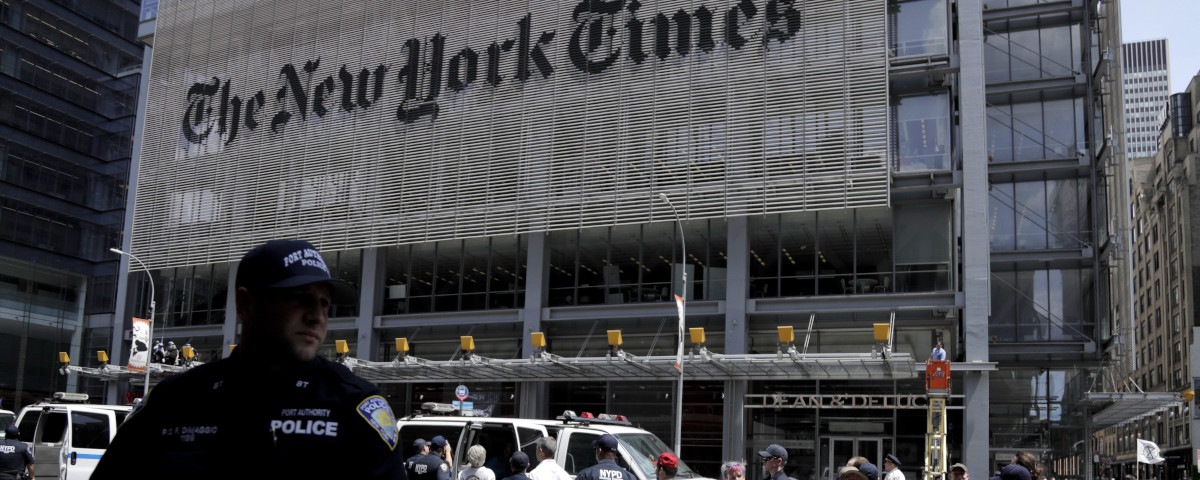During a visit to the newly renovated New York Times offices some years ago, I asked the editor, Dean Baquet, why he thought it fit to publish all of President Donald Trump’s tweets, in spite of the fact that many seemed only about Trump’s insatiable need to remain cock of the walk, talk of the town.
Baquet, who was in a rush, did not cite journalistic integrity or executive privilege or the public’s right to know, but retaining the competitive edge: “If we don’t publish them, someone else will,” Baquet said.
The implication was that the Times needed to hold down its position as the paper of record and, even as the whale that it is, needed to swat off a hundred toothy minnows whittling away at a diminishing market. Editorial decisions, it seemed to me, were not necessarily aligned with responsible journalism but with business concerns.
Such reasoning, plus charges of niche marketing and unabashed partisan reporting, go to the heart of the issues raised in the 28th Munk Debate earlier this month which went forward on a resolution that people should not trust the mainstream media.
Matt Taibbi, a veteran journalist, former feature writer for Rolling Stone, Substack contributor, and author of several books including Insane Clown President, teamed up with British author and associate editor for the Spectator, Douglas Murray, to argue in favour of the resolution. Canadian journalist and New Yorker staff writer Malcolm Gladwell and New York Times columnist Michelle Goldberg argued against the resolution and in favour of continued trust in the mainstream media.
Goldberg is not an ideologue. On the contrary. Her opening remarks conceded grounds when she said that journalists “like the rest of us” sometimes miss things, get things wrong, and are overwhelmed by events that exceed expectations and perhaps their capacity to imagine the future in a whirlwind of events. After all, nobody, or hardly anybody, predicted the fall of the Soviet Empire. Nobody, or hardly anybody, imagined the 2008 financial crash. Nobody or hardly anybody predicted that Donald Trump would win the Republican Party primary, and even seasoned reporters such as David Frum were certain that Hillary Clinton would break the glass ceiling, leaving Trump locked out of office.
“We may screw up,” Goldberg said, “but when we do, we try to figure out what we did wrong and fix it.”
Gladwell expanded Goldberg’s argument, suggesting that “trust” is not about substance, which every journalist sometimes gets wrong, but about hardwired newsroom processes.
“When I worked at the Washington Post, which is the definition of mainstream media,” Gladwell said, “there were two things that were drilled into me. One was the importance of fairness. If you quoted someone denouncing someone else, you had to call up the person denounced and get a response. The second was accuracy.”
Gladwell went on to emphasize that processes including forensic analysis, cross-checking, oversight, and so forth have not changed. “If anything, many organizations like the New Yorker, spend more money on fact-checking than ever before, in part because there is so much more scrutiny and oversight.
Matt Taibbi was having none of this. Not because he was privy to shoddy practices, but because his issue was not the process but the “ethos” which justified niche journalism: preaching to the converted, killing stories, or burying them alive when they are not the kind of thing that your audience wishes to hear.
Being mainstream, according to Taibbi, means sitting comfortably on one side of the fence or the other. It means distrusting the people to reach their own conclusions. It means campaigning rather than reporting. Fox News and the legacy broadsheets are equally part of the problem. Rather than resist hyper-partisanship, they capitalize on and exploit a dangerous situation.
Taibbi quoted a Pew Center survey to wit: 93 percent of Fox’s audience vote Republican, while 95 percent of the MSNBC audience votes Democrat, and New York Times readers are 91 percent Democrats.
Reporters and journalists no longer bother to distance themselves from their own biases and political agendas, Taibbi claimed, adding that his journalist father had a saying “the story is the boss” which meant that you don’t lead but follow the story wherever it goes. Sadly, as he outlined, the story is no longer the boss. Taibbi left himself open to charges of sentimentalism when he looked back to the days when the CBS anchor, Walter Cronkite, was the most trusted person in the country.

“Who did Cronkite represent?” Gladwell fired back. Certainly not black people or women or immigrants or gay people or people with a mildly left-wing view. Gladwell could have added that Cronkite’s America was very different than America today. Not only were there so many more blue suits in the street back then, but the CBS anchor had hardly any competition, and none like Fox.
Douglas Murray came to Taibbi’s defense. Addressing Gladwell he said: “You did a little nasty jab at Matt…trying to pretend that he is desperate for an era of white men broadcasting.” Turning to Taibbi, he continued. “We’ve only just met, but you didn’t give off that vibe to me.” Taibbi motioned that he did not harbour such feelings.
More than the other three debaters, Murray stretched the truth and deployed ad hominem arguments (which Gladwell did as well). He quipped that “you really know that the world is in trouble when Canada becomes very interesting.” He claimed that in Canada “the government can tell the media what to do and the media does the bidding of the Canadian government.” This has not been my experience.
Murray claimed that the New York Times vilified the trucker protests, a charge which Goldberg proved entirely exaggerated. But when he raised the Hunter Biden laptop story, things heated up. Why didn’t the Washington Post and the Times follow up on the story published in the New York Post prior to Biden’s election?
“Why didn’t they call up people? Why didn’t they check whether the emails were accurate? Because they didn’t want Biden to lose the election. He was their guy, and they didn’t want to screw that up,” said Murray.
The moderator, Rudyard Griffiths, underscored Murray’s charge, pointing out that this was an important allegation. Everyone felt certain that the gloves were about to come off.
Goldberg took up the challenge: “The person who wrote the New York Post story asked to have their name taken off it because they thought the story was unreliable. The people who had the hard drive would not give it to the Washington Post and the New York Times. The media has covered this, but they have also been careful, given the fact that this stuff still cannot be authenticated.”
The crux of her argument, it seemed to me, was just what she had stated earlier—that process trumped perception and though she and others were sorry that some readers believed that the Times had withheld the laptop business for scurrilous reasons, the truth is that the story was not ready for prime time.
Goldberg went on to cite many instances where the New York Times opted for counter-intuitional stories over reader-pleasing narratives. But she sounded defensive in part because she was reacting to a charge that she did not get in front of. She said that readers of the mainstream media were safer and better protected if they stuck with the mainstream and avoided the contrarians. Murray agreed that one should read the mainstream media, but “you just shouldn’t trust them.”
If I understood Murray’s point correctly (which I may not have) he meant that readers cannot and should not stop thinking for themselves. There is no way to coast, take in the news as if it were breakfast cereal (in the manner that was maybe possible in the 1950s). To me, it seems not at all clear that any of the news media can do anything to rectify the situation. To take the moral high ground does not seem possible. It is not even clear that such grounds exist any longer.
Taibbi, whose critique hinged on the possibility that journalists could do a whole lot better, closed with little hope. Regardless of how the chips fell in this debate, he said, the question as to whether to trust or not to trust the media has already been settled. Taibbi quoted from a recent Gallup poll, which found that just 7 percent of Americans have a great deal of trust in the media; 27 percent have a fair amount; 28 percent do not have much confidence; a full 38 percent have none at all in newspapers, TV, and radio.
According to a Reuters Institute 2022 report, trust in the Canadian news has dropped 13 percentage points since 2016. Only 42 percent of Canadian respondents trust most news, most of the time. But as low as the number is, it is significantly higher than the post-debate figure.
Murray and Taibbi managed to swing some 19 percent to their side, leaving only 33 percent trusting souls shuffling nervously out of Roy Thomson Hall.
Recommended for You

Peter Menzies: Travis Dhanraj’s CBC resignation reveals the truth about media ‘diversity’ in Canada

‘Not a guide to practical action’: David Frum on 60 years of George Grant’s Lament for a Nation

Ginny Roth and Brian Dijkema: Why Ontario should allow independent schools and unlock true choice in education

Need to Know: Canadian multiculturalism is ‘dangerously adrift’



